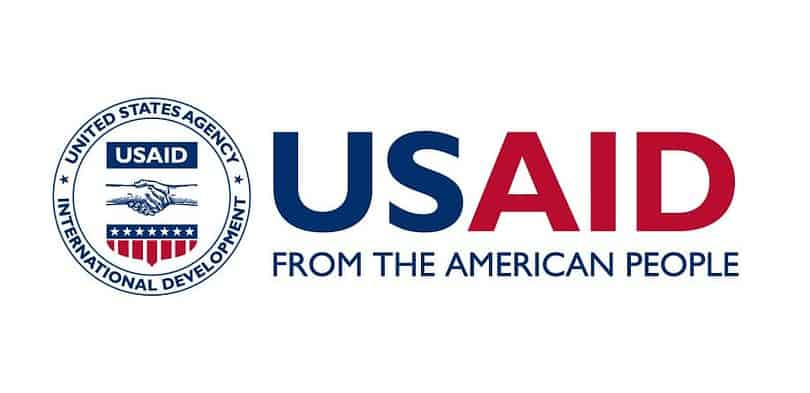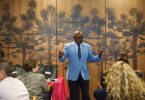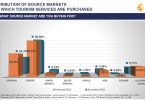MR. CAPEHART: Let’s start big picture. How and in what ways are women disproportionately affected by climate change?
ايڊمنسٽريٽر پاور: Well, first, let me thank those of you who are putting on this event.
And just say this is my 10th UNGA – no, my 11th UNGA and this is the first time I’ve been in an event like this, which is just taking head on a major source of many problems and a major necessity in terms of solutions.
So I’d say first, women are, as all marginalized persons, all vulnerable populations tend to be, disproportionately affected by climate change. We see it in minority communities in this country over and over again. We see it all around the world playing out.
If you look at actual casualty rates or death rates in natural emergencies, you see women and children bearing the brunt. And you might think, oh, well, that’s a biological difference and maybe they can’t outrun the tidal waves or whatever.
But it’s much about gender norms and be it, feeling like you need permission in order to know whether you can leave and be trapped in homes. It’s in general, just actually being responsible for so much in terms of the family’s welfare. And not being in a position, again, to put one’s own welfare very prominently.
You see it day to day, the vulnerabilities, as water dries up, and I’ve just been to so many places – I’m sure many of you have as well – where it is just so stark even from year to year, how different the landscapes are from the ones just ten years ago. But one thing hasn’t changed that much, which is the norm that it is women who go collect the water in rural communities, so as the water dries up near the community, women have to walk further and further.
And that’s of course been a terrible means by which, or route by which, women have been continually subjected to gender-based violence en route. So the further you go, the less protection you have, the more that those other norms that don’t on their face seem to have that much to do with climate change per se – a norm that indicates it’s okay to assault or attack a woman – that norm then intersects and thus means a disparate impact again on women in that sector as well.
MR. CAPEHART: So where in the world are these issues most acute?
ايڊمنسٽريٽر پاور: Well, it’s hard to choose. I’ll give you just a little bit of a brief tour of my recent horizon, or whatever the backward version of a horizon is.
Over the last year, I traveled to Pakistan when a third of the country was underwater because of a combination of unprecedented rains and melting glaciers – colliding at once – and inadequate preparation and infrastructure. And again, it’s women often, the last to stay to protect property, to protect livestock as men go in search of help. I mean, everybody’s affected in terrible ways.
Traveling from there, then, to northern Kenya and to Somalia to see five straight failed rainy seasons. So the complete opposite of what I had seen in Pakistan, which is just parched land. Millions of livestock died of the drought in the Horn of Africa. You might think, well, the main effect will be on the pastoralists, which are, of course, the people who raise the livestock.
And sure, you actually saw a big spike in suicides of these men, because they, for millennia, had been raising animals and suddenly their entire herds of goats or camels were wiped out just like that.
But when it comes to managing the effects on families and the severe acute malnutrition that young people were left with, particularly kids under five, it was women who had to both deal with despondent husbands, deal with the question of what becomes of sons who had imagined that lifestyle continuing and now are suddenly thinking, “How do I possibly give them an alternative life, an alternative vocation,” but then also being in a position to try to find food for the youngest.
So I mean, again, it hits in different places. I was just, the last one I offer you is, I was just in Fiji.
And of course, for all the Pacific Islands – it’s almost all of them – it’s an existential threat.
It’s about whole nationalities having to figure out in some number of years ahead where they move to, what they do, like, if they can live in the parts of the country, in particular islands, that are so low lying.
And just small examples with, where women are out there, growing industry.
In this instance, I met with a woman with a group of women who were growing sea grapes – which, by the way, are delicious.
I had never had sea grapes before. And they were so proud of their sea grapes. And, USAID is trying to support them, get a microloan so that they can build their business, grow their business.
But just incidentally, and this is where climate change just comes up at every turn.
They say, well, the only problem these days is we now have to take our boats further and further out, because as the ocean warms, it warms particularly close to the shore, so we have to go further. So we go further to get our sea grapes, which means much longer away from all the other obligations we have as women in the household.
Moreover, we use fuel-powered boats, so we’re putting more emissions out into the air as we go and try to retrieve these sea grapes in order to grow our businesses.
So, you know, again, everywhere you look, Pacific Islands, Africa, Asia – it’s walloping communities.
MR. CAPEHART: I want to get to your mentioned microloans, I want to get to the aid that USAID gives. But are these issues that you’re just talking about, that’s a lot of the developing world, but is what we’re talking about confined to the developing world?
ايڊمنسٽريٽر پاور: No, hardly, but I just happen to –
MR. CAPEHART: That’s called a leading question.
ايڊمنسٽريٽر پاور: We live, I mean – we’re I think on our twenty-third natural disaster here that has cost over one billion dollars in the U.S. right now.
We’ve experienced our hottest day, week, and month on record, I think just in the last couple of months. For the first time we had to shut down certain businesses, and summer camps, and opportunities for young people because of wildfire smoke extending into our lives.
And again, the disparate impacts. This is maybe a small example, but when a kid can’t go to camp, it’s going to be the working mom – in most households, certainly mine – that is going to have to figure out what – it’s like a version of what happened with COVID.
When climate hits, whether in small or fleeting ways that have severe health impacts and severe lifestyle impacts, it is going to fall to the multitaskers of the home to manage that.
But, I mean, also just the financial effects of the damage now being done on what feels like a near-daily basis to some parts of the United States can’t be overstated.
It happens just not to be what USAID works on because we do our work overseas.
And our work, I will say one of the biggest tensions and challenges that we grapple with is we’re given fixed resources and resources that are not keeping up at all with the development setbacks that climate change is causing.
Even though they’re growing, our resources are growing. But you just can’t keep up. But the other problem is not just that. It’s that so much of our resources go to keeping people alive in emergency circumstances like those in Libya just over the last week – or those I mentioned in Pakistan or Somalia.
And what you wouldn’t do is take all of that humanitarian assistance and invest it instead in disaster-resilient infrastructure or in drought-resistant seeds or in those microloans to small farmers who are actually capable of using their smartphones to anticipate extreme weather events and at least mitigate what those losses are.
So that – what I’ve described is kind of the difference between resilience and emergency relief. And we are very weighted as a government and as a donor community writ large toward – I mean, it’s a beautiful thing, it’s a beautiful privilege to try to help people get through the worst moments of their lives.
But in doing it that way, which is quite a stopgap, you know that you’re going to be back at it. And that is extra heartbreaking.
Because it used to say, we’d say climate shock, but now it’s kind of like, is it a shock when it is a predictable feature of a particular part of a country’s farming life? And so what does that require of us?
If the pie were bigger, we would dramatically increase our investments in resilience, which is what we should be doing. It’s hard to not save lives in the interest of saving lives in the longer term. So we are balancing this as best we can. But it’s not a fun balancing act.
MR. CAPEHART: You anticipated the question I was going to ask, jumping off the micro-loans piece, so I’m going to jump ahead. Let’s talk about the relationship between economic development and climate change.
How closely linked are these issues and how is USAID addressing them both at the same time?
ايڊمنسٽريٽر پاور: Well, I mean, I’d say we are in or we are moving toward, let me say because we have a long way to go embedding attention to climate change as a design feature of all of our work.
So one sort of structural, maybe wonky example of this is that we have taken our Food Security and Resilience Bureau and merged it with our climate team. And so that is where – but the nexus it is quite obvious to people is not a perfect overlap, but there’s tons – agriculture is a major source of emissions, so those emissions need to come down.
And of course, climate-smart agriculture is going to be the way that we preserve food security or increase it in the years ahead. So that’s one merger. But in terms of education, it’s the number one. I mean, all of us, any of us who have kids, it’s the number one thing kids want to know about us is not only what’s going to happen to the world that I know, but also what can I do about it?
So even thinking about education in governance – it is so fundamentally destabilizing for governments that can’t keep up with climate change, whether on the resilience side or on the emergency side, because it compounds this loss of trust in institutions that we see in so many parts of the world.
That’s not just about the export of surveillance technologies, you know, from the PRC or democracies being under attack by other means.
There are also just things that are happening in the world that when a government can’t keep up, it compounds that cynicism about institutions. So this is a long way of saying we do governance work at USAID, we do education, we do public health that’s completely connected to climate.
As you look at changing malaria patterns, the WHO, I think, is predicting an additional 250,000 people will have died by 2030 of climate-related – whether it’s heat stress or malaria or water shortages, malnutrition that grows out of it.
So where we need to get as an agency is to embed attention to resilience and attention to climate change and what it means for a community in everything we do.
In a sense, USAID is a climate agency, even if we still have a climate team that works as a climate team per se, mainstreaming this agenda is what our missions are trying to do all around the world.
And this is not because I anticipate the, you know, the concerns of some maybe in our domestic politics on this – and I’m sure you’ll get there, but this isn’t USAID foisting anything.
This is the cri de coeur for you know, heard all around the world, that this is a game changer. Our development trajectories were going here – COVID hit and now we have what could feel like a COVID-like, not not of the same scale, but battering again and again and again.
So just as we’re now thinking differently about pandemic prevention, what should that lead us to think about when it comes to embedding climate in the mindset of all public spending and all notions of mobilizing, mobilizing private capital, because that’s, of course, going to be a big part of the solution.
So we’re that’s – it’s this mainstreaming and not having climate live over here. But given that it is this game changer and given it’s our host countries and the communities in which we work and of it works. It’s John F. Kennedy’s pleading gives us more of the tools to adapt to this shell-shocking phenomenon.
MR. CAPEHART: Well, I asked the question about economic development because, with economic development comes perhaps better lives, and better living conditions, which then can exacerbate the issues related to climate change.
So how do you – and I wrote it down really fast – that mainstreaming, how in mainstreaming climate in the things that you do. How do you find that balance between helping people help themselves, while at the same time not doing it in a way that exacerbates the climate problems that we all have to face?
ايڊمنسٽريٽر پاور: Yeah, and I mean, I think one example I think that you’re alluding to is, you know, as people get richer, they buy more meat and that causes, you know, more emissions or they travel more, they’re flying more there.
And absolutely, I mean, we’ve seen that the emissions trajectory in both the PRC and India reflected that.
Our emissions trajectory, back as we were bringing our economy online and modernizing, absolutely reflects that. So I think that is profound. I will say the fact that solar power, the cost of solar has come down by 85 percent. The cost of wind is down by 55 percent. Where we work, the demand signal for renewables is very, very significant – which doesn’t get it mediating some of the other features of getting wealthier.
But it does get to the urgency of making clean energy transitions as these prices come down. It is a better bet. And so again, when we have these exchanges on the Hill and it looks to some who are skeptical somehow still of climate programming, you know, that we’re bringing our green agenda to the countries in the communities we’re working in – no, it’s not like that at all.
They’re saying we can’t afford this other thing.
But actually, we can pop up a solar panel and have a water pump that we’ve been trying to get in this village. We can go off the grid in ways we never – where the state is not going to get here any time soon.
This was my experience out in Bekaa Valley in Lebanon, where USAID had worked to, you know, build a bunch of solar panels that powered electricity and ended up actually reducing tension between refugees who were being generously sheltered by Lebanese host communities, Syrian refugees, and the Lebanese.
Because they were no longer fighting over water because they had water because they had solar – but to attach to the grid, no way. And so then those tensions, who knows what would happen with that.
So the idea is that these investments are cost-effective over time, that actually you can develop, along the lines of what you’re describing, in a clean way.
I think the other aspects of consumption need to be dealt with as part of civic education and as part of norm work because it is true that in many, many societies, and again, including our own back in the day, as you increase your livelihoods, your income, consumables are a very attractive way to expand those new resources.
This feels like a high-class problem in most of the countries we’re talking about. I mean, I’m talking about working with small-scale farmers who are paying double this year for fertilizer than they were paying before Putin invaded Ukraine, who just need a little loan to be able to get access to some of those drought-resistant seeds that are going to increase yields by 25 percent.
But again, finding the resources to get them that. Getting the private sector interested in adaptation. But the question that we should be thinking now about, if we can be successful, if we can help them withstand the negative effects of climate change and the like here in America, grow jobs out of also these changes to their economies, then what?
Then we will be grappling with the kinds of things that have further fueled emissions in more recently developed countries.
MR. CAPEHART: As you alluded to many times, there’s a lot of good news related to the development of clean energy alternatives. That being said, though, global emissions once again hit a record high in 2022, and carbon dioxide in the atmosphere has risen to levels not seen in millions of years. Are we moving in the wrong direction despite glimmers of hope?
ايڊمنسٽريٽر پاور: Well, I mean, I think all of us can answer that question in two ways. And we talk to ourselves all day – on the one hand this, and on the other hand that. But what we can say is we’re certainly not moving fast enough. And you know what breaks my heart is, it’s a little bit like another version of the vicious cycle you were kind of describing.
But when you see the wildfires, and the rate of wildfires, and then all of the carbon emitted and all of the good that had been done with carbon emission reductions – and that being not washed away – whatever, smoked away, burned away – that’s heartbreaking because these investments are accelerating.
They are building momentum. So I think that, and that’s not the only thing that’s heartbreaking.
There’s so much that’s happening day to day and a little bit of the despondency, I think, setting in as well – as people just open the newspaper, and whether it’s in their own community or one further afield or even something like what happened in Libya, which just captures the imagination of, which was its own sui generis issue with regard to governance and infrastructure, but would not have happened that way but for the intensity of Storm Daniel, which is just being seen in so many communities.
But what I do think it’s important to come back to, at least as proof of concept, is that in Paris the projections – they were, we the world, were on a track to warm 4 degrees and we are now on a track to warm 2.5 degrees.
So that is a reflection of the agency that people have claimed over this trajectory. The problem is we need to curb warming at 1.5 degrees, but that delta from four to 2.5 should give people at least a sense that actually collectively we are doing things that are making a difference. There’s no doubt we are doing things that are making a difference.
If I could, though, I think the area that we have – I mean, as John Kerry likes to say, if we don’t get mitigation right and the carbon reductions right, there’ll be no planet to adapt. He makes a comment like that a lot.
We, at USAID, are in the mitigation and adaptation business, as is Secretary Kerry and his team. But I think in mitigation, what I think gives one hope is just how much the private sector has leaped in now recognizing that there’s money to be made. And I’d love to rely on people’s good intentions and their feeling of fellow humanity, but it’s much more reliable if they think there’s money to be made.
And that shift has occurred. And you see it in the IRA, which is already defying even the best projections and extrapolations that people did. I mean, this is going to have way more collateral effects and bring down carbon way more, I think, than people could have, just strictly speaking, anticipated because of a cascade now of private sector interest fueled and catalyzed by the underlying legislation.
And so too, as the prices come down again, there’s a virtuous cycle. Adaptation – we’re not we’re not there. And I don’t know if we’re ten years behind where we are on mitigation – where we are on mitigation.
Like it’s the same thing going to happen in ten years where we look back and say, oh, we lost all that time. Why couldn’t private-sector actors have seen as well that there’s good to be done and money to be made?
I guess if you have to think that way around the insurance industry in the agricultural sector, in Fintech, I mean, all these tools are going to be absolutely critical in particularly rural areas and those areas that are most vulnerable to climate change.
But about two percent of funding for adaptation comes from the private sector right now, and that has just got to change.
So President Biden and we have done a big call to action to the private sector, but it’s slow going. And even if you take – forget the specific sectors that have a direct nexus with the need to build resilience – look at it in even more stark terms. The market share that so many companies are hoping to capture is themselves going to have less money to spend, maybe in flight, maybe at war.
And so the positive of that is, hey, if we can help them adapt and be more resilient and where these emergencies happen, but don’t wallop communities in the same way and they bounce back, those are consumers that will be our consumers. But the negative is what if, you know, millions, tens of millions of consumers are taken offline because they are driven into poverty?
The predictions now are that 100 million more people driven into extreme poverty by 2030. But that’s within our hand, that adaptation. There’s so much less to, as I would say to my kids, there’s room to grow.
The areas that are the most troubling in some ways, there’s really room to grow. And you could see a cascade of the kind that we’ve seen on carbon mitigation.
MR. CAPEHART: Administrator Power, we got a minute and eight seconds and this will be the final question. The name of this conference is This is Climate: Women Leading the Charge. So how do you see women reshaping climate leadership?
ايڊمنسٽريٽر پاور: We, USAID, and Amazon, the company, not the forest, launched a gender equality fund, a gender equity fund at COP, and we launched it with $6 million in funding. And this is for women.
It’s for projects that will benefit women, it’s for projects that are driven by women in adaptation or in mitigation – the whole or the protection of natural ecosystems – but things broadly in the climate space.
And today we have the Visa Foundation and Reckitt, a company out of the United Kingdom, who have joined us and matched that initial – USAID put in $3 million, Amazon put in $3 million, and have added $6 million.
Why do I mention this? It’s not a huge amount of money yet. We are going to get up to $60 million, we hope, in rapid order.
This is part of another cascade that we would like to see. We’ve put out a request for proposals, incredible women leaders are putting proposals in.
These can be small projects. A lot of the climate finance right now is not going to small projects, it’s going to big international organizations. So working more with local partners is going to be absolutely key.
But these are going to be the success stories that are going to inspire people to invest more and to believe that change can come. And sadly, there are just not that many examples of climate finance facilities that are targeted and tailored toward women, even though women are bearing the greatest brunt.
And women, I think, in my experience, are doing the most innovative work in dealing with the consequences of climate change and trying to lower those consequences in the years ahead.
MR. CAPEHART: Samantha Power, the 19th Administrator of USAID, thank you very much for joining us today.
ايڊمنسٽريٽر پاور: Thanks, Jonathan.
What is USAID?
USAID stands for the United States Agency for International Development. It is an independent agency of the United States federal government that is primarily responsible for administering civilian foreign aid and development assistance. USAID’s mission is to promote economic and social development in countries around the world, with a particular focus on reducing poverty, promoting democracy, and addressing global challenges such as public health crises, environmental sustainability, and humanitarian crises.
Some of the key functions and activities of USAID include:
- Providing humanitarian assistance: USAID responds to natural disasters, conflicts, and other emergencies by providing humanitarian aid, including food, shelter, and medical supplies, to affected populations.
- Promoting economic development: USAID works to stimulate economic growth in developing countries by supporting projects and programs that create jobs, improve infrastructure, and foster private sector development.
- Supporting democracy and governance: USAID promotes democratic governance by providing technical assistance and support for fair and transparent elections, strengthening civil society organizations, and advocating for human rights and the rule of law.
- Advancing global health: USAID plays a crucial role in global health initiatives, including efforts to combat infectious diseases like HIV/AIDS, malaria, and COVID-19. It supports healthcare systems strengthening, family planning, and maternal and child health programs.
- Environmental sustainability: USAID works to address environmental challenges, including climate change and natural resource management, through projects that promote conservation, renewable energy, and sustainable agriculture.
- Education and capacity building: USAID invests in education and capacity-building programs to enhance the skills and knowledge of individuals and institutions in developing countries, thereby contributing to long-term development.
- Food security and agriculture: USAID supports programs aimed at improving food security, increasing agricultural productivity, and reducing hunger and malnutrition in vulnerable populations.
USAID operates in partnership with governments, non-governmental organizations, international organizations, and other stakeholders to achieve its development goals. It is often involved in projects and initiatives that aim to alleviate poverty, promote stability, and enhance the well-being of people in countries where it operates. The agency’s work is guided by the foreign policy objectives of the United States and the broader goal of fostering global development and progress.























